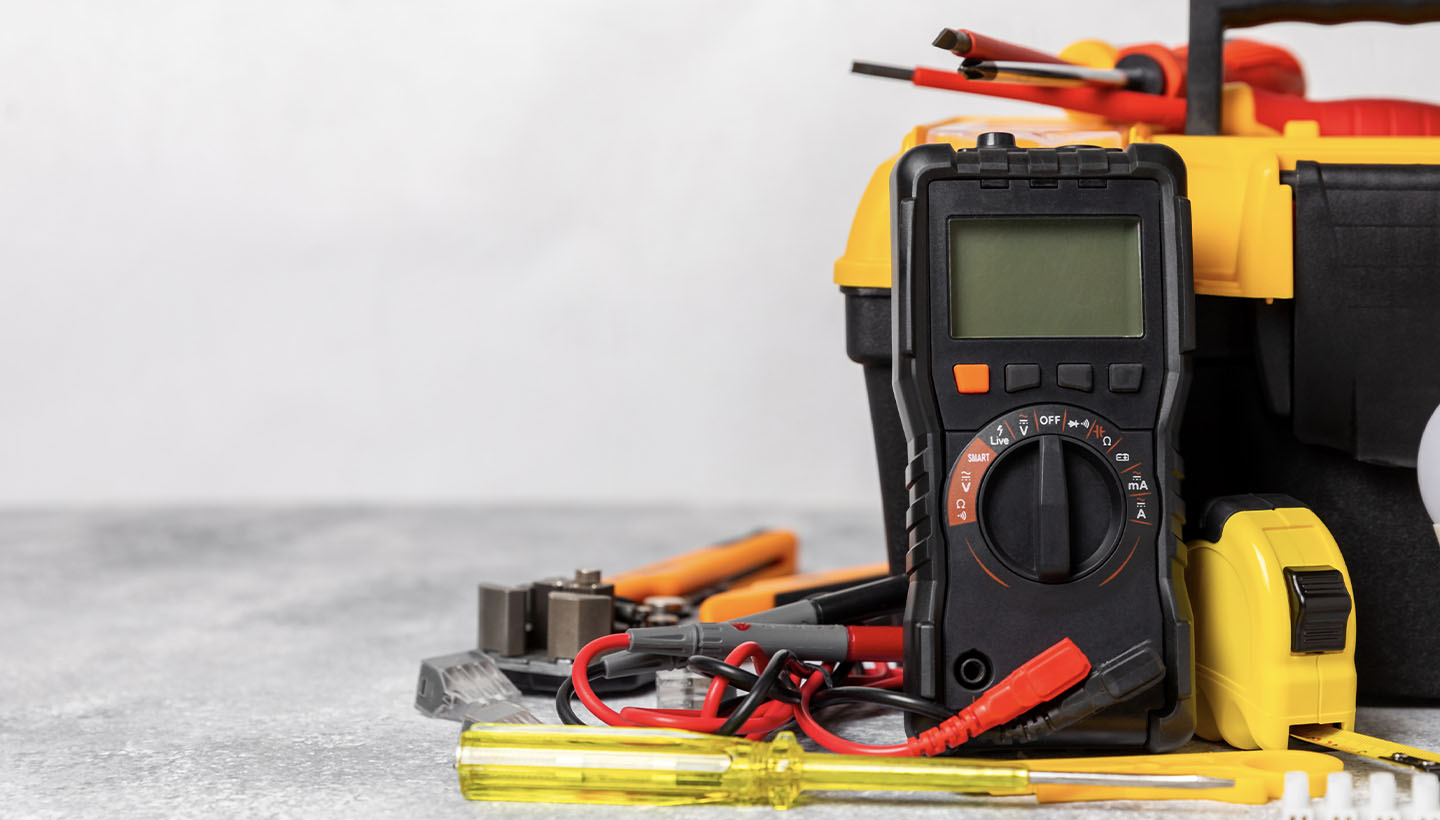
The Best Home Inspector Tools For 2024
Home inspector tools are, largely, a matter of personal preference, and they run the gamut from the simple to the sophisticated. While one home inspector might swear by a tape measure and an A-frame ladder, another may never start a job without their laser measure, telescopic ladder, and drone.
This begs the question: What tools should you have in your home inspector toolkit?
We found out, with help from seasoned AHIT Instructor Henry “Hank” Sanders. If you’re a new or seasoned home inspector (or thinking of becoming one), here’s what Hank recommends for your toolkit.
First, Ask Yourself Three Questions When Considering Home Inspector Tools
The sheer variety of tools marketed to home inspectors can feel a little dizzying. Hank, who is also a successful owner of Heartland Home Inspections and Smart Inspector Tools, has a simple way to shop for tools.
With any new tool, ask yourself three questions:
Will it improve my safety?
Will it help me do my job more efficiently?
Will it help me make more money?
“These are the questions I use when I’m evaluating any tool for my own use on the job and testing out tools for Smart Home Inspector Tools,” Hank says.
They’re good questions, after all. Anything to cut through the noise of must-have and nice-to-have tools of the trade is a win.
Home Inspector Tools That Keep You Safe
Safety on the job is BIG. In fact, the Standards of Practice for both the American Society of Home Inspectors (ASHI) and the International Association of Certified Home Inspectors (InterNACHI™) detail what home inspectors should do and don’t have to do in terms of safety.
Two big guidelines that both Standards mention? You don’t have to walk on a roof, and you don’t have to go into a crawl space that isn’t readily accessible. Hank’s top two tool picks for safety help in both of these scenarios (and plenty of others).
Telescoping Pole With Inspection Camera
See everything while keeping your feet planted safely on the ground. A telescopic pole inspection camera makes it easier and safer to see on top of roofs, inside crawl spaces, in between lattices on decks, inside gutters, on top of cabinets, in attics, and so many more hard-to-reach areas. The inspection camera also connects to your phone using wireless Bluetooth technology to give you great visibility at your fingertips.
Lightweight Telescoping Ladder
Trusty old A-frame ladders are great, but if you want an upgrade, consider a lightweight telescoping ladder. These ladders are easy to transport, extend as high as 14 feet (and to heights in between), have one-touch release buttons, and lock firmly in place to keep you steady. Plus, they’re remarkably compact, making them MUCH easier to get in and out of your truck.
Home Inspector Tools That Help You Work More Efficiently
Home inspection efficiency is the difference between completing the average three- to four-hour home inspection and one that takes all day. As Hank tells us, you’re juggling a lot during an inspection, so it’s in your best interest to use tools that help make the job go as smoothly as possible.
A Rugged, Organized Tool Bag and/or Belt
Your tool bag and/or tool belt is like your backpack for school. You need one – and for more reasons than transporting your tools. Hank recommends a tool bag that’s:
- Organized. You want to be able to find what you need right when you need it.
- Rugged. You’ll be handling your tool bag a lot, so choose one that’s durable and stands up to heavy transport.
- Ergonomic. You need it to be comfortable and hands-free since you’ll be wearing it for some or all parts of your inspection.
One extra feature to consider? A retractable tool retainer that tethers lightweight tools to you and attaches to your bag or belt. There’s nothing more annoying than losing an important (and perhaps expensive) tool accidentally. This helps prevent that.
A Tactical-Style Rechargeable Flashlight
A flashlight might seem like a simple choice, and you might think any run-of-the-mill flashlight will do. Not so, Hank says.
“You need to put a little thought into the type of flashlight you choose,” he says. “It’s best to pick a tactical-style flashlight that’s rechargeable and that has the ideal number of lumens.”
Using a rechargeable flashlight eliminates the need to always have extra batteries on hand. Just make it part of your inspection routine to recharge your flashlight in between jobs.
Hank adds that lumens, or the measure of brightness in a flashlight, can be tricky. Choose a flashlight with too much lumen power and everything it shines on will be washed out and hard to see. Choose one with too little and you’re stuck rummaging in the dark.
Hank recommends a sweet spot of around 1,500 lumens for the best visibility and to save battery power.
Hank’s Advice on High-Tech Gadgets
For tech-minded inspectors, Hank offers a quick tip on using efficiency-boosting, high-tech gadgets like drones, infrared cameras, and inspection bots.
“Make sure you’re trained on how to use them,” Hank says. “There is always a learning curve, so make sure you know how to use a new gadget well before taking it on the job.”
This helps conserve your time and protect your investment in case, for example, you lose connection and can’t retrieve your inspection bot or drone on a job. (Yep – it’s happened.)
Home Inspection Tools That Can Help You Make More Money
In home inspection, offering add-on (or ancillary) services can help you make more money per inspection. Many home inspectors earn extra certifications to build their income, Hank included. He’s noticed a few trends recently in tools that are ideal for add-on services.
Electrical Panel Mapping Kits
Per National Electrical Code (NEC), every electrical panel in a home should be labeled with circuits that are clearly identified. This isn’t always the case though, Hank says. The electrical circuit testing, mapping, and labeling process can also be a multi-hour job. Electrical panel mapping kits simplify and speed up this process.
“With a kit, a home inspector can map an electrical panel in a house in about an hour,” Hank says.
Plus, it’s a job that can bring in a few hundred extra dollars on top of a standard home inspection and be offered to homeowners year-round.
Chimney Inspection Cameras
Full chimney inspections – beyond the visible – are usually not part of a standard home inspection. Typically, home inspectors only inspect as much as they can see in a chimney and recommend a more thorough inspection by a chimney inspector.
But when you use a chimney inspection camera, you can get a 360-degree view inside a chimney to easily spot problems. This is a growing add-on service among home inspectors in colder regions.
Smart Foundation Level
Hank also tells us foundation inspection is becoming a more popular ancillary service for home inspectors. A smart level altimeter makes measuring and detection of elevation issues easier and faster. You can use it to quickly plot base points, measure, and generate elevation surveys with the included app. This is important for home inspection, home maintenance, and home renovations.
A Quick Tip on Inspection Report Software
Home inspection report software is now a must-have for home inspectors to quickly generate professional inspection reports for clients. Yet, there are so many choices out there and it’s hard to choose. What’s Hank’s advice?
“Choosing inspection report software is like choosing a car,” he says. “Give the software a test drive and choose the one you like best. What works for someone else may not work for you and that’s OK.”
Most of the inspection report software available today offers free trials. Hank recommends taking advantage of these free trials to get a feel for the system and how it works for you before purchasing.
Advice For New Home Inspectors Starting Out in 2024
Are you thinking of jumping into the world of home inspection this year? Hank has some advice for new home inspectors – and he regularly shares these tips with every AHIT student in his classes.
“Find a trusted mentor to help you and who you can partner with as you grow in the industry,” Hank says. “And never stop learning. There’s so much to learn in this industry and to stay current on as it evolves. Make it a point to never stop learning.”
Teaching for AHIT, Hank adds, is one way he loves to give back and help share the knowledge.
Want more advice on the best tools and gadgets for home inspection? Check out 21 Home Inspector Tools of the Trade.
Interested in Starting a Career in Home Inspection? AHIT Has You Covered!
From teaching you about the tools you need for the job to the inspection process, AHIT is here for you! We’ve been training successful home inspectors since 1993. Our live classroom courses include valuable, hands-on field training at real homes while our online courses offer the ultimate flexibility for your schedule. Find your state requirements and get started today!





